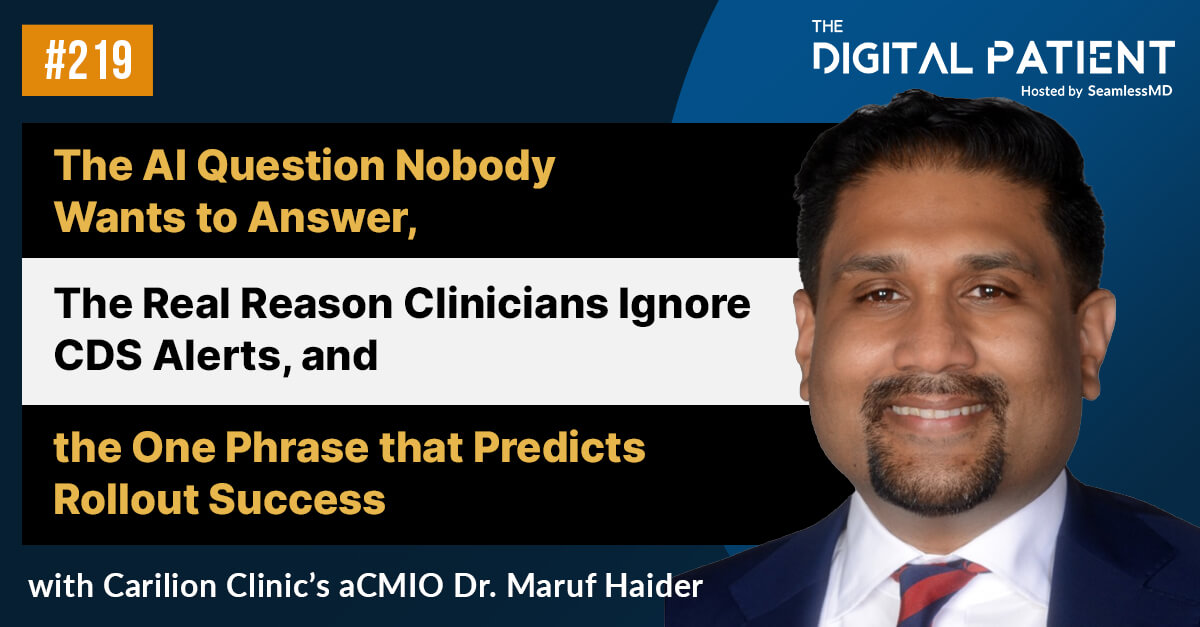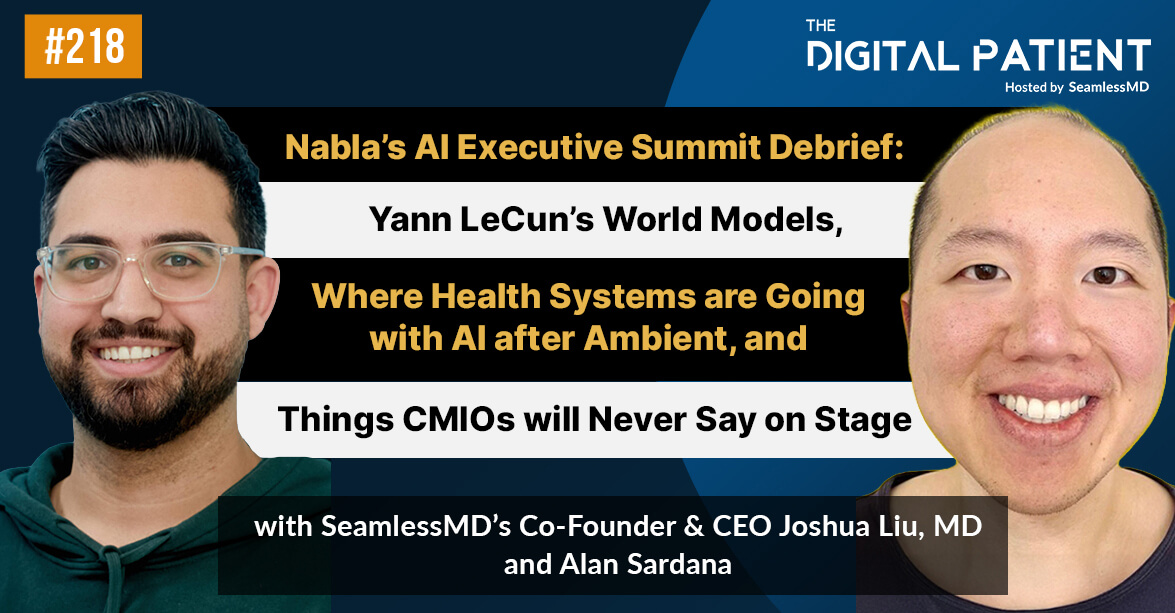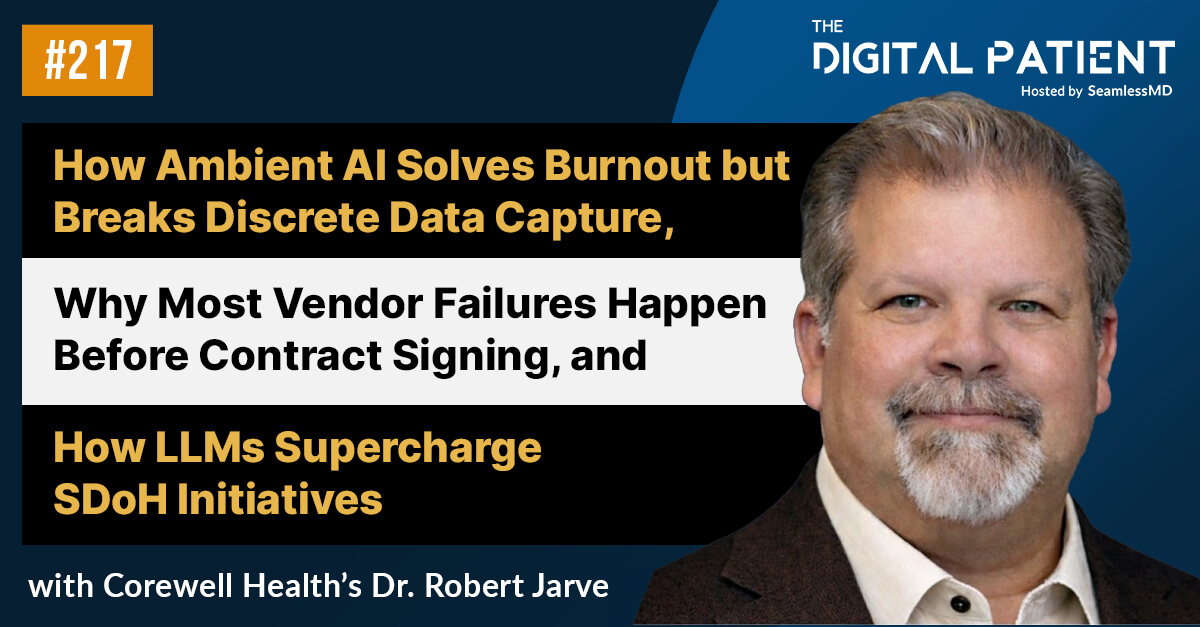Subscribe on: RSS | SPOTIFY | APPLE PODCAST | GOOGLE | BREAKER | ANCHOR
On this episode of "The Digital Patient" podcast, hosts Alan Sardana & Dr. Joshua Liu speak with Dr. Alexander Petron, CMIO at WellSpan Health, about "Harnessing Ambient Voice Tech to Tackle Staff Burnout, Balancing Patient Satisfaction with Clinician Wellbeing, Knowing "Your Why" to drive Clinical Outcomes, and more..." Click the play button to listen or read the show notes below.
Audio:
Video:
Guest(s):
- Dr. Alexander Petron, CMIO at WellSpan Health
- Dr. Joshua Liu (@joshuapliu), Co-founder & CEO at SeamlessMD
Episode 102 - Show Notes:
[01:00] Dr. Petron discusses his journey to becoming a physician, including his initial desire to pursue medicine in college, his family's suggestion to pursue computer science instead, his foray into the world of early AI, and his eventual decision to follow his passion for healthcare after working in information systems consulting;
[03:46] How Dr. Petron’s background in computer science and love for pediatric medicine led him to informatics and how he found his true calling by blending both worlds;
[07:13] Why getting an MBA allowed Dr. Petron to gain traditional business training and navigate the structures of large healthcare institutions, which has shaped how he leads as a CMIO, and changed his focus by teaching him the importance of measuring and managing structures through data-driven and analytic-driven approaches;
[11:30] Why Dr. Petron has moved away from traditional measures to outcome measures, highlighting the importance of outcomes rather than just reducing numbers (e.g. number of inbasket messages vs. clinician burnout);
[13:04] Why Dr. Petron advises physicians who want to get into leadership roles to be humble, find a mentor they click with, run with opportunities to lead, and to not shy away from traditional learning structures like business school or medical management type courses;
[14:30] How to get a mentor by seeking out formal structures, or by getting involved, having intellectual curiosity, being passionate about what you’re doing, and not being afraid to ask probing questions;
[16:04] How Dr. Petron envisions a future for patient rooms where keyboards and mice are removed, and instead, ambient and generative AI technologies are used to record, document, and generate information, allowing physicians to interact with patients in a more natural way, improving the patient-physician relationship;
[19:44] Why Dr. Petron emphasizes the importance of careful change management to avoid losing buy-in from stakeholders, how there isn't much conceptual pushback on his vision for the future, but skepticism in reality due to the possibility of setbacks and negative experiences with new technology;
[21:15] How Dr. Petron is rolling out Ambient Voice technology, the positive feedback they’ve received from patients who feel more engaged in their healthcare journey;
[23:03] How Dr. Petron identifies physicians struggling with clinical documentation and experiencing burnout, particularly in primary care and medical specialties, and offers them the new technology, acknowledging it's not for everyone and requires human intervention, but it’s the first step in the journey towards the fully automated modes that will become more common over time;
[27:21] Why Dr. Petron believes Ambient Voice technology should not be sold as a tool to increase patient throughput because it could harm provider wellbeing, yet how patient throughput could increase as a byproduct of focusing on patient satisfaction and clinician wellbeing;
[30:15] How Dr. Petron views change management à la Kotter; creating a sense of urgency, building a guiding coalition, finding early adopters, creating short-term wins, and embedding the change in day-to-day operations to make it sustainable and avoid it becoming a novelty;
[36:50] How the role of a CMIO has evolved over time, from being a change management specialist in the early days of technology implementation to now having more structured career paths and opportunities, and why Dr. Petron emphasizes the importance of remaining clinically connected in the role to align with outcomes and “your why”;
Fast 5 / Lightning Round:
- What is your favorite book or book you’ve gifted the most?
"The Second Curve" by Ian Morrison
- Who is a person–dead or alive–you’d love to meet?
Gandhi
- Would you rather have Super strength, super speed, or the ability to read people’s minds?
Super speed, for less self-serving reasons
- What is something in healthcare you believe that others might find insane?
"See one, Do one, Teach one” (whereas AI algorithms is “see thousands”)
- If you could travel back in time to any event or moment, what would it be and why?
"Childhood" (knowing what he knows now; fixing mistakes he’s made, making the world a better place)
.svg)










.png)
